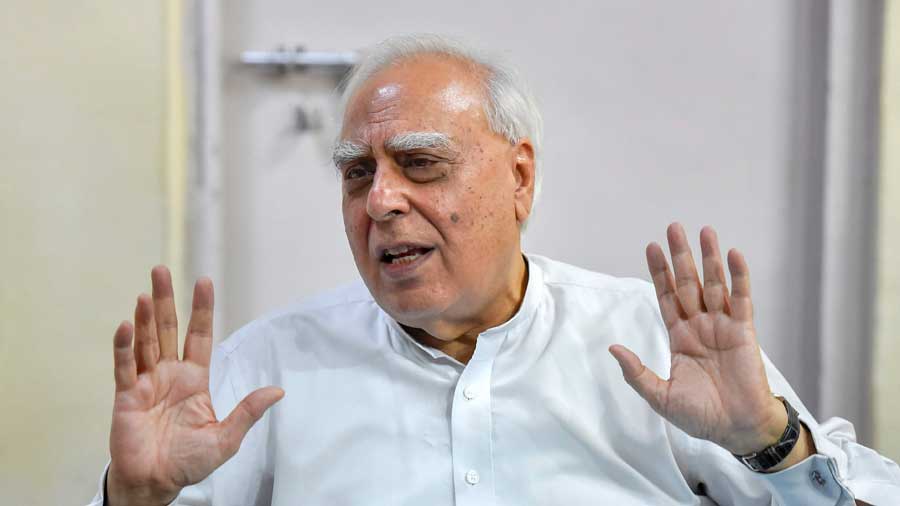Veteran lawyer and former Union minister Kapil Sibal resigned from the Congress and filed his nomination for the Rajya Sabha on Wednesday with the backing of the Samajwadi Party.
Sibal clarified that he had not joined the Samajwadi Party although Akhilesh Yadav, Ram Gopal Yadav and other leaders of the party were present when he filed his nomination for the Upper House. Sibal is scheduled to retire in July but is keen to remain in Parliament.
With his relationship with the Congress strained — Sibal being the only leader from the dissenting G-23 cabal to urge the Gandhi family to step aside — he had approached Akhilesh for support and got it.
Sibal knew it would be difficult for him to flourish in the Congress because of his strident public posturing on the question of leadership as well as the party’s organisational plight.
Other key members of the G-23 had been guarded and avoided attacking Sonia Gandhi or Rahul Gandhi directly. Although Sibal didn’t make any personal attacks on them, either, he had argued for a new leadership and underlined the failures of those at the helm over the past few years. Others like Ghulam Nabi Azad, Anand Sharma, Shashi Tharoor and Manish Tewari had spoken a different language and focused on issues rather than personalities.
Sibal demonstrated remarkable grace while breaking the relationship of three decades. Revealing that he had resigned from the Congress on May 16, he refused to target the leadership or speak about the issues that had compelled him to quit.
He told The Telegraph: “You think a thousand times while breaking a relationship of 30 years. It is not easy.”
Sibal refused to answer questions about the Congress’s future and the leadership of the Gandhis.
“I was a Congress leader. But not any more.… I resigned from the Congress on May 16. I’ll not say anything about the Congress… not appropriate for me to say anything. The Congress has been very kind to me,” Sibal said.
He had earlier told the media: “I have filed for nomination as an Independent candidate. I have always wanted to be an independent voice in the country.… It is important to be an independent voice. We are all constrained by the fact that we are members of parties and have to abide by the discipline of that party but it is important to have an independent voice.
“While staying in the Opposition, we want to create an alliance so that we can oppose the Modi government. I am thankful to Akhilesh Yadavji.… We, many people, are coming together for 2024. We will expose the shortcomings of the central government ahead of 2024. All will put our views before the public.”
While Sibal’s ideological commitments have never been in doubt and nobody suspected him of plans to cross over to the BJP, his decision to avoid expressing personal grievances while parting ways differentiates him from other such leaders who have chosen to attack the Gandhi family.
The young Hardik Patel went to the extent of questioning the Congress leadership’s patriotism and alleging that they hated India, Gujarat and Hinduism. He made personal attacks on Rahul and senior leaders in Gujarat.
Even the veteran Sunil Jakhar launched a furious attack on the party leadership for allegedly protecting the corrupt and sycophantic.
Sibal saw many highpoints during his stint in the Congress. Sent to the Rajya Sabha in 1998, he was made a cabinet minister in the Manmohan Singh government when he won the Lok Sabha election from Chandni Chowk in Delhi in 2004.
He won the Lok Sabha seat again in 2009 and remained a minister for 10 years, holding important portfolios like human resource development, law, science and technology, communications and information technology. He was also the party’s spokesperson.
Sibal wasn’t very happy with the leadership during the 2019 parliamentary election and firmed up his position against the leadership after successive defeats. He was one of the key architects of the G-23 and hosted a dinner meeting for all Opposition leaders where many expressed anti-Congress views.
Many Congress loyalists criticised him and there was a demonstration against him by workers of the party’s Delhi unit. The Congress never tried to reach out to him unlike it did with other G-23 leaders, convincing him that his continuance in the party had become untenable.











